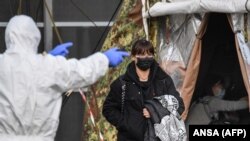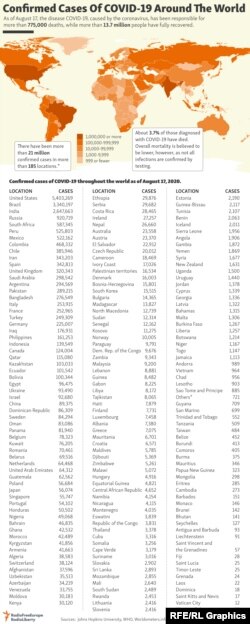A woman has died in Tehran of a suspected coronavirus infection, an Iranian state newspaper reports.
Without citing any sources, the daily IRAN newspaper said on February 12 that the 63-year-old Iranian woman died in hospital three days earlier.
An investigation has been ordered into the cause of her death, according to the report.
Kianush Jahanpour, a spokesman for Iran's Health Ministry, denied the report, insisting that there have been "no cases of coronavirus in Iran."
Russian Patients Discharged
Meanwhile, Russia has discharged its second patient hospitalized with the new coronavirus after the patient fully recovered from the disease, officials say.
A tourist from China hospitalized in the Siberian region of Zabaikalye was discharged on February 12 after tests showed he was "completely healthy and poses no danger to people around him," according to local health officials.
The previous day, a hospital in the Tyumen region bordering Kazakhstan discharged a Chinese female student who had also been diagnosed with the COVID-19 virus.
Both patients suffered from a mild form of the disease, doctors said. People who were in contact with them are still under quarantine.
The COVID-19 has killed more than 1,100 people in China, where the overall number of infections now stands at more than 44,000.
As the epidemic spread to more than 20 countries around the world, Russia reported only two confirmed cases of infection with COVID-19, according to the country’s consumer-protection agency Rospotrebnadzor.
Russia has evacuated dozens of its citizens from China and placed them under quarantine in the Tyumen region.
The government has halted most of Russian air traffic to China, suspended all trains connecting Russia to China, and closed the land border between the two countries. Moscow has also temporarily stopped issuing work visas to Chinese citizens.
Uzbeks Send Medical Supplies
Elsewhere, Uzbekistan is sending protective cloths, disposable gloves, masks, and other supplies to China to support Beijing's efforts to control the spread of the coronavirus.
President Shavkat Mirziyoev signed the relevant decree on February 11, the government said, as a fully loaded military cargo plane departed the Uzbek capital, Tashkent.
The February 12 cabinet statement said the government was preparing a second shipment.
Chinese authorities have been reporting shortages of protective medical equipment since the COVID-19 virus emerged late last year.
So far, there have been no confirmed cases in Uzbekistan or the other four Central Asian republics -- Kazakhstan, Kyrgyzstan, Tajikistan, and Turkmenistan.
Uzbekistan has stopped all regular flights to China, its major trade partner, as a protective measure.
The country’s Health Ministry said 771 Uzbek citizens who had recently returned from China remained in quarantine.













